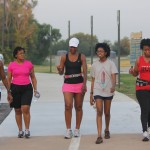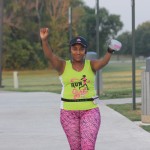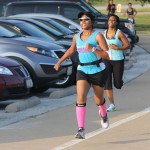By Kayla Graves, NDG Intern

It’s six thirty in the morning and the parking lot at Arlington’s River Legacy Park is echoing with the chatter of over a hundred African American women. Laces tied and water bottles at the ready, the women laugh as the group organizer, Scymentress Williams, clad in bright pink cheetah print running tights, gives directions into a megaphone and cracks a joke before everyone breaks into smaller groups of five or six. It’s time to run.
About four out five African American women are considered overweight or obese, according to a 2012 study from the Office of Minority Health. In 2009 the group Black Girls Run! was formed by Toni Carey and Ashley Hicks in an effort to combat obesity in the African American community, as well as provide resources and encouragement for all levels of runners.
Williams, one of the three Dallas Ambassadors, acts as an administrator for the group. She provides information pertaining to nutrition, running gear and events. Although the chapter has over a 1,000 members on Facebook, Williams said only around 300 of them are active.
“A lot of people just watch and use the group for motivation,” Williams said. “My job is to just encourage and inspire everybody to just get out there and run. I just want to encourage forward movement, so it doesn’t matter if you’re not a runner yet.”
There are currently 44 of Black Girls Run! (BGR!) chapters throughout the country and the group plan to expand to 50 by the end of the year. The Dallas area chapter, which includes Dallas, Tarrant, Denton, Collin and Rockwall counties has nine running groups:
- Addison
- Arlington/Grand Prairie/Fort Worth
- Dallas
- Flower Mound/Lewisville/Denton
- Frisco/Plano/McKinney
- Garland/Mesquite/Rowlett/Rockwall
- Irving
- Keller/HEB/Alliance/Saginaw/NorthRichlandHills/Grapevine; and
- Lancaster/DeSoto/Cedar Hill/Duncanville.
“We’re expanding [because] I want to be able to provide access,” Williams said. “I want to eliminate barriers.”

Joniee Eubanks, 39, ran for the first with BGR! on July 14 after hearing from it by word of mouth and did not have any previous running experience.
“I thought it was amazing,” Eubanks said. “I felt welcomed. For me to come and not know what I was getting into it was a good experience.”
Marilyn Hellum, 56, started running in 2003 after taking a class with her friend at Luke’s Locker.
“I had never run before,” Hellum said. “The first day of the running clinic was January 10, 2003 and it was the coldest day ever. I was driving and was like, ‘whose idea was this?’ I hate the cold, it’s the coldest day ever and I’m not a fan of running. But we did it and I haven’t looked back since.”
After going to a meet and greet on New Year’s Eve Hellum joined BGR! on New Year’s Day 2010 and now runs with the Uptown/Downtown group. Hellum said that due to her age there is also a stereotype associated with older people not being able run that she wants to burst right through.
“My philosophy is that if you take care of your body when you’re young it will take care of you when you’re old,” Hellum said. “You keep moving, you’re body is going to keep moving. You stop moving, your body is going to stop moving. We don’t have to get to 50 and say, ‘I can’t do this anymore.’ You can do this at 90.”
Brenda Newton, 52, who is part of theDallasgroup, discovered the group through Hellum during work, but said she considered herself athletic due to her military experience in the 80s.
“It’s good to run with somebody else who will encourage you because some days you feel like you don’t want to that but they keep you going,” Newton said. “You can do so much more than you think you can.”
Williams runs five to six days a week when she is not training and runs up to everyday for two weeks when training. She is currently training for the Rock n Roll San Antonio marathon in November.
“Running is my therapy,” Williams said. “It’s cheaper than therapy. It gives me this adrenaline rush. I used to be a news producer so running gives me that same adrenaline rush when I worked in the fast pace of news.”

A 2009 Los Angeles Times article points out that excersing in groups provides the social support to continue working out.Newtonsaid she feels inspired through the group.
“I’m not by myself,”Newtonsaid. “I have somebody that’s teaching me different things about running and health.”
Williams said she believes that there is a misconception about black women not running because of their hair. She said about half of the women in the group have natural hair styles, so that excuse can be taken out of the mix of things preventing women from exercising.
“Women want to protect their hair and it’s kind of hard to protect a relaxer when you just sweated it out,” Williams said.
Because African American women have more obesity related diseases, such as diabetes and high blood pressure, Hellum said she thinks there is a stereotype because people see those statistics on the news.
“My main goal is to just get people moving and let them know they can move,” Hellum said. “Anybody can do it, but at the same time, if you don’t [exercise] all of those things are inevitable.”
Williams said that the group gives her an opportunity to exercise and socialize with women who look like her.
“The group is so much more than a running group,” Williams said. “It’s like a sisterhood. I talk to these ladies about parenting my son. I talk to them about food. I talk to them about problems. I’ve never been part of a group that has allowed me to be who I am. No holds bar, no limits, no restrictions to be who you are.”
One of the things Hellum said stands out about the group is the philosophy that everyone makes everyone better.
“No matter if you’re advanced or a beginner, a marathoner or an ultra-marathoner, we all bring something to the group and we can all take something from the group,” Hellum said. “We all truly make each other better.”





Great work ladies! I’m proud of you!